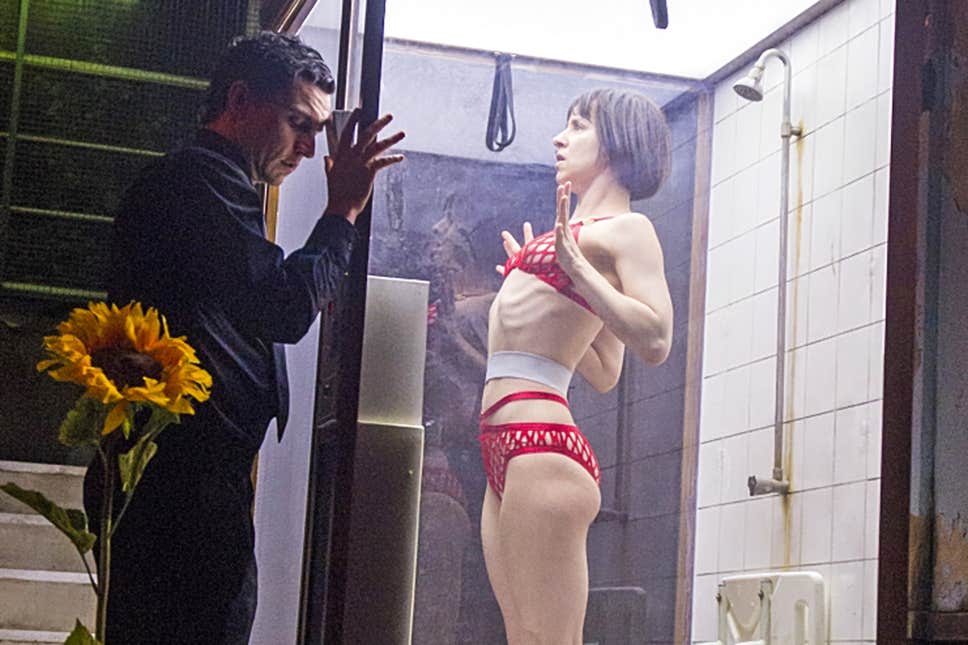By the time Iqbal Khan’s Anthony and Cleopatra reached its dénouement at the RSC, we were almost three hours in and, despite the production being an excellent one, I could feel my eyelids becoming heavy. Not under Khan’s watch. Before clasping a venomous asp to her breast, Cleopatra whipped off one of her many opulent costumes and appeared momentarily nude before slipping on an equally resplendent dressing gown. Needless to say, rows of slightly slouching torsos jolted bolt upright in waves across the auditorium in a domino effect. Cut to a few years later and I was working behind the theatre bar as Prasanna Puwanarajah revamped the 17th century Venice Preserved in 1980s punk style – complete with S&M PVC gimp suits and a trolley of sex toys. Members of the audience frequently left during the interval and registered their discomfort with staff.
This is nothing new, of course. From the sexual revolution of the 1960s, we’ve seen writers and directors un-corseting our strait-laced sentiments one controversial production at a time. The extensive nudity of the 1969 Oh! Calcutta!, an avant-garde theatre review (punning on “O quel cul t’as!“, French for “What an arse you have!”) shocked while Sarah Kane’s 1998 Cleansed caused much fainting with its graphic scenes of torture, mutilation and sex. I would argue that our generation has now become somewhat immune to the ‘shock value’ of sex and nudity. While my grandmother once spoke to me of being aghast at ITV’s The Durrell’s, we are the generation who barely (if you’ll pardon the pun) bat an eyelid at voyeuristic cameras goggling at the night-time activities of Love Island contestants or who watch as sliding doors reveal a selection of nude bodies for the perusal and preference of another in Naked Attraction. And it’s not just sex and nudity – from the films of Quentin Tarantino to Game of Thrones, violence on screen has fallen into unprecedented depths of blood, guts and gore in recent years.
Nevertheless, shocking displays in theatre does still tend to hit the headlines. Unlike film or TV, even for the most uninhibited amongst us, there is still something startling about actually experiencing such scenes; at seeing them so close at hand, in the flesh. I feel that it is valuable to be periodically shocked. We don’t, after all, go to the theatre to see the world through rose-tinted spectacles or to be delivered palatable entertainment on a mundane platter which fails to challenge us or penetrate the grey of ordinary life. Like the critic Michael Billington, however, I also feel that ‘there is a vital distinction to be made between the moral awakening that comes from shock and the visceral impact of unmitigated horror’.
I feel a kind of weariness every time I see theatre which capitalises on seriously graphic nudity, sex or violence. I’d like to turn to the director and say, ‘Don’t try and shock me. Don’t try and use my wincing and curling toes to make me out as some unenlightened prude.’ Through useless shock, I’m being played, unwittingly pounced on from the comfort of my seat, and it’s no surprise, therefore, to find that ‘shock’ has its etymology in military language.
At times, I can’t help but feel a frustration with and a resistance to the style of theatre coined by Aleks Sierz as ‘in-yer-face-theatre.’ Emerging in the 90s, it’s aggressive, provocative and brash, invading the audience’s personal space and grabbing them by the scruff of their neck for a good shaking. Leaving Anthony and Cleopatra, the nudity felt gratuitous and gimmicky: if having Cleopatra bare all to the audience was so crucial, then why was she so swiftly re-clad? Not only is there no nudity in the play but it seemed to encroach on the aura of untouchability which surrounds her sexuality. The Greek tragedians never showed extreme violence on stage but always related the information to the audience through a messenger and whilst this feels egregious today, I empathise with the Greek proclivity to ‘leave something to the imagination’.
If nudity, sex and violence are fundamental themes which the writer has explicitly and thoroughly explored through their writing, or the heightened staging of them truly adds to the audience’s understanding, then far be it from me to stand in the way of educational theatre. But, if you assume baring derrières is enough to get my bum on the seat, then you can think again.



